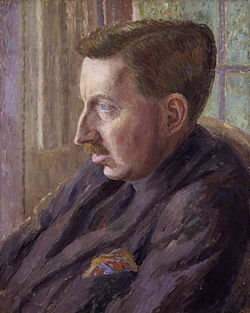E. M. Forster Quote
There is much that is immortal in this medieval lady. The dragons have gone, and so have the knights, but still she lingers in our midst. She reigned in many an early Victorian castle, and was Queen of much early Victorian song. It is sweet to protect her in the intervals of business, sweet to pay her honour when she has cooked our dinner well. But alas! the creature grows degenerate. In her heart also there are springing up strange desires. She too is enamoured of heavy winds, and vast panoramas, and green expanses of the sea. She has marked the kingdom of this world, how full it is of wealth, and beauty, and war--a radiant crust, built around the central fires, spinning towards the receding heavens. Men, declaring that she inspires them to it, move joyfully over the surface, having the most delightful meetings with other men, happy, not because they are masculine, but because they are alive. Before the show breaks up she would like to drop the august title of the Eternal Woman, and go there as her transitory self.
There is much that is immortal in this medieval lady. The dragons have gone, and so have the knights, but still she lingers in our midst. She reigned in many an early Victorian castle, and was Queen of much early Victorian song. It is sweet to protect her in the intervals of business, sweet to pay her honour when she has cooked our dinner well. But alas! the creature grows degenerate. In her heart also there are springing up strange desires. She too is enamoured of heavy winds, and vast panoramas, and green expanses of the sea. She has marked the kingdom of this world, how full it is of wealth, and beauty, and war--a radiant crust, built around the central fires, spinning towards the receding heavens. Men, declaring that she inspires them to it, move joyfully over the surface, having the most delightful meetings with other men, happy, not because they are masculine, but because they are alive. Before the show breaks up she would like to drop the august title of the Eternal Woman, and go there as her transitory self.
Related Quotes
Certainly we can say that the pace of modern life, increased and supported by our technology in general and our personal electronics in particular, has resulted in a short attention span and an addict...
About E. M. Forster
Considered one of the most successful of the Edwardian era English novelists, he was nominated for the Nobel Prize in Literature in 22 separate years. He declined a knighthood in 1949, though he received the Order of Merit upon his 90th birthday. Forster was made a Member of the Order of the Companions of Honour in 1953, and in 1961 he was one of the first five authors named as a Companion of Literature by the Royal Society of Literature.
After attending Tonbridge School, Forster studied history and classics at King's College, Cambridge, where he met fellow future writers such as Lytton Strachey and Leonard Woolf. He then travelled throughout Europe before publishing his first novel, Where Angels Fear to Tread, in 1905. The last of his novels to be published, Maurice, is a tale of homosexual love in early 20th-century England. While completed in 1914, the novel was not published until 1971, the year after his death.
Many of his novels were posthumously adapted for cinema, including Merchant Ivory Productions of A Room with a View (1985), Maurice (1987) and Howards End (1992), critically acclaimed period dramas which featured lavish sets and esteemed British actors, including Helena Bonham Carter, Daniel Day-Lewis, Hugh Grant, Anthony Hopkins and Emma Thompson. Director David Lean filmed another well-received adaptation, A Passage to India, in 1984.
